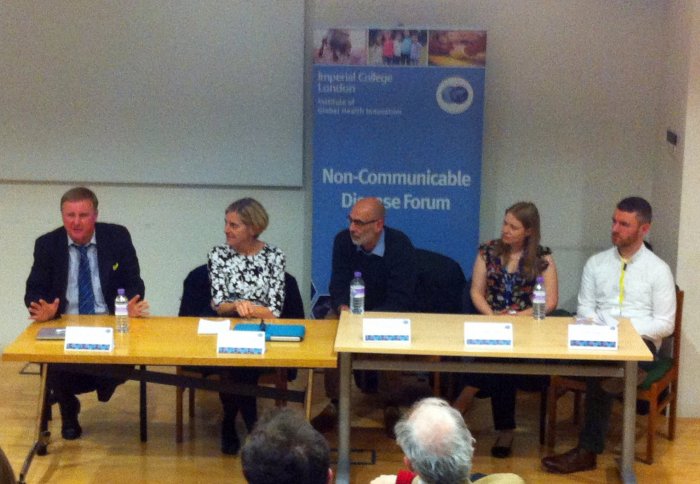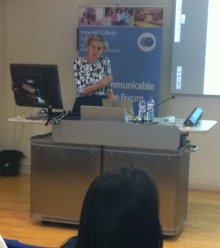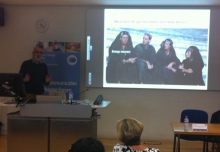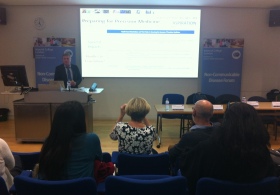Celebrating World Food Day with our Non-Communicable Disease Forum
by Jo Seed

Left to right: Profs Jeremy Nicholson, Kathryn Maitland and Gary Frost, Dr Nuala Calder and Kevin Walsh
IGHI's Monthly NCD Forum opens up for the new term with a focus this month on gut and nutritional health research across two continents.
Staff, students and members of the public re-convened yesterday for the first of this academic year’s Non-Communicable Disease Forums.
Our monthly NCD Forum aims to bring together researchers and students from Imperial and afar to discuss and disseminate findings on current research and innovations in the treatment and prevention of NCDs, the world’s number one killer.
The relationship between nutrition, the gut microbiome and the metabolites it produces have profound effects on human health and is directly relevant to human disease development.
With World Food Day taking place right now, the NCD Forum provided a key opportunity to discuss research and innovative new therapies and treatments to aid gut and nutritional health.
 The Forum was chaired by Professor of Respiratory Epidemiology and Public Health, Professor Peter Burney and heard from a wide array of speakers, including Professor Kathryn Maitland, Professor of Tropical Paediatric Infectious Diseases. 100 million children are affected by malnutrition worldwide, and Kath’s research is looking into how the gut and nutrition is adding to the route source of disease and what can be done to combat this.
The Forum was chaired by Professor of Respiratory Epidemiology and Public Health, Professor Peter Burney and heard from a wide array of speakers, including Professor Kathryn Maitland, Professor of Tropical Paediatric Infectious Diseases. 100 million children are affected by malnutrition worldwide, and Kath’s research is looking into how the gut and nutrition is adding to the route source of disease and what can be done to combat this.
 Professor Gary Frost, Professor of Nutrition and Dietetics discussed nutrition, signaling and short-chain fatty acids whilst Research Postgraduate Kevin Walsh talked about the link between severe anaemia and gut barrier dysfunction.
Professor Gary Frost, Professor of Nutrition and Dietetics discussed nutrition, signaling and short-chain fatty acids whilst Research Postgraduate Kevin Walsh talked about the link between severe anaemia and gut barrier dysfunction.
We also heard from ISSF Global Health Clinical Research Fellow Dr Nuala Calder, who updated us on the MIMBLE Study (Modifying intestinal integrity and microbiome in severe malnutrition with legume-based feeds) - an innovative new way of using cow peas to treat malnutrition.
 Our keynote speaker was Professor Jeremy Nicholson, Head of Imperial’s Department of Surgery and Cancer and Director of IGHI’s Centre for Digestive and Gut Health. Jeremy discussed how a healthy gut microbiome is essential for disease prevention. Nearly every disease is connected to the microbiome, making gut health & nutrition extremely important for global health. Also, antimicrobial resistance will have a huge impact on human health, as there are no new antibiotics available, so it is now even more imperative that we find new and innovative ways of dealing with infections.
Our keynote speaker was Professor Jeremy Nicholson, Head of Imperial’s Department of Surgery and Cancer and Director of IGHI’s Centre for Digestive and Gut Health. Jeremy discussed how a healthy gut microbiome is essential for disease prevention. Nearly every disease is connected to the microbiome, making gut health & nutrition extremely important for global health. Also, antimicrobial resistance will have a huge impact on human health, as there are no new antibiotics available, so it is now even more imperative that we find new and innovative ways of dealing with infections.
He also went on to talk about the iKnife, a surgical knife which tests tissue as it contacts it during an operation and immediately gives information as to whether that tissue contains cancer cells that need to be removed.
The event concluded with a panel discussion and a networking reception afterwards.
If you are interested to be updated on upcoming NCD Forums, join our NCD Forum mailing list here.
View all the photos from the event here.
Article text (excluding photos or graphics) © Imperial College London.
Photos and graphics subject to third party copyright used with permission or © Imperial College London.
Reporter
Jo Seed
Institute of Global Health Innovation